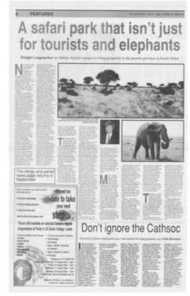Page 9, 16th August 2002
Page 9

Report an error
Noticed an error on this page?If you've noticed an error in this article please click here to report it.
Tags
Share
Related articles
An Anvil Under The Nazi Hammer
German Church's Stand Against Euthanasia
From Mr Karol Gajewski Sir, At The Risk Of Sounding
Pope To Beatify ‘lion Of Münster’
Lion Of Munster Challenges Hitler
From Mr Karol Gajewski Sir, I was surprised to read
in Gerard Noel's review of the CostaGavras film Amen that Bishop von Galen of Munster's famous sermons of August 1941 resulted in the suspension of the Nazi "Euthanasia" or "T4" programme inside Germany. Von Galen's outspoken and forthright stance is sometimes contrasted with the "silence" of Pius when confronted With the cataclysmic evil of the Holocaust.
After all, if von Galen was able to halt the "euthanasia" with fiery words would not Pius — given his exalted moral status — have been able to achieve the greater good and halt the Auschwitz death trains?
The effects of von Galen's sermons were not as straightforward as some critics of Pius would have us believe.
For example, the institution for the mentally ill at Hadamar celebrated the death of its 10,000th victim in Autumn 1941, some three months after the bishop's condemnation. Furthermore, the running down of the "euthanasia" programme owed less to von Galen than the simple fact that targets for extermination had already been achieved, if not exceeded. • As a result, many T4 murder personnel moved into Poland and took orders from Odilo Globocnik, the founder of Sobibor and Treblinka extermination camps, thus paving the way for the Holocaust itself.
Often overlooked, too, is the initial and divided response of the Nazi leadership to the challenge issued by the bishop. Operation Barbarossa, the offensive against the USSR which had begun in late June 1941, was to change the ground rules for policy against the Catholic Church. Josef Goebbels warned Hitler that arrest and imprisonment of von Galen would have catastrophic effects on morale inside the armed forces, and that Westphalia itself would "be lost to the Nazi cause". This observa tion was borne out when a protest letter was received from the mostdecorated Luftwaffe general of the war, Werner von Moelders. Moelders threatened to return his medals and foment disobedience if von Galen's accusations proved true.
In spite of suggestions from other leading Nazis that von Galen should be at least interned, if not executed, Hitler decided to take no action against the bishop himself in view of the critical strategic situation on the Eastern Front.
This did not, however, save a number of priests in the diocese of Munster from execution after they read von Galen's sermon from their own parish pulpits.
Later, in 1942, Martin Bormann recorded Hitler's own thoughts on the whole affair.
The Fiihrer observed that once the war had been won by Germany, von Galen would undoubtedly pay the ultimate penalty for his outspoken criticism of the Nazi "euthanasia": "I shall exact retribution to the last farthing...no 't' will be left uncrossed, no T left undotted".
Yours faithfully, KAROL JOZEF GAJEWSKI, Sandbach, Cheshire
blog comments powered by Disqus















